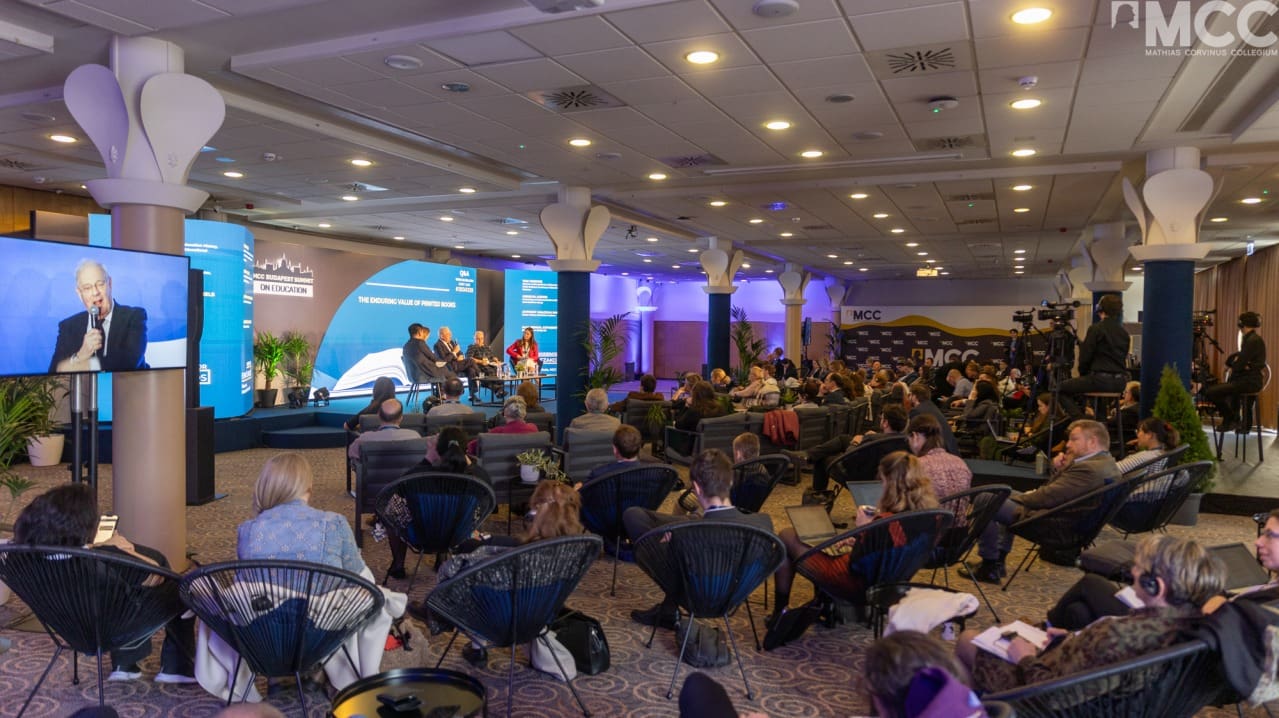MCC’s Summit on Education continued on 28 February at the Budapest campus of Mathias Corvinus Collegium. More panel discussions were on the schedule on the second day, with a wide variety of interesting topics.
The first roundtable discussed the role of family versus the role of a school in a child’s education. The participants were Angela Gandra, former National Secretary of the Family at the Ministry of Women, Family and Human Rights of Brazil and current president of the Ives Gandra Institute of Law, Philosophy and Economy; Carlos Hoevel, professor of History of Economic and Political Ideas, Business Ethics and Philosophy of Economics at the Catholic University of Argentina and director of the University’s Center of Studies in Economy and Culture; couples’ therapist Gábor Mihalec; and Anthony O’Hear, a professor of philosophy at the University of Buckingham.
Ms Gandra started by stating that
she believes the primary role in a child’s education should be fulfilled by the family,
and the state’s obligation is to protect and aid the family in that. She used the metaphor of two wings while talking about children: one being the family and one the public school system, which have to work in coordination with each other to make each child fly. Mr Hoevel hit a more sinister tone, saying that there is a ‘universal project to redesign human nature,’ and the family is the only resistance against that. Mr Mihalec continued with a pessimistic theme, pointing out that many children come from struggling, dysfunctional families, and schools should serve as ‘a point of stability’ for them.
Mr O’Hear shared that the family is an autonomous community that predates written law in human history. He also opined that children need to be ‘trained in habits of virtue’; then pointed out that the UN’s Universal Declaration of Human Rights states the parents have the right to choose what type of education they want for their child. However, that right is not protected in many places in the world right now, even in liberal countries.
He told of a push by progressive politicians in Scotland to have a ‘state-appointed guardian’ in each family, whose duty would be to ensure that the child is properly raised by the family. However, the Supreme Court of the United Kingdom struck down the proposal, writing in the opinion that it is typically the ambition of a totalitarian state to assume control over the children over the parents.
Philosophy was up next on ‘the menu’. Till Kinzel, docent at Technische Universität Berlin; András Lánczi, Director of the Institute of Political Science and Philosophy at Corvinus University; philosopher and researcher Leonardo Orlando; Barrz Strauss, a professor of history and humanistic studies at Cornell University; and Mikolaj Slawkowski-Rode, adjunct professor at the University of Warsaw and research fellow at the University of Oxford gathered for a discussion on the role of philosophy in public education.
Mr Kinzel told the audience that, paradoxically,
philosophy is both divorced and not divorced from practical pedagogy at the same time.
Even if a teacher is not actively discussing philosophical questions with their students, they are bound to come across philosophical questions regarding morality or epistemology in the education process. Mr Lánczi lamented the fact that, in his opinion, modernity has pushed politics to the centre of philosophy, and now every philosopher is expected to be either left-wing or right-wing.
Mr Orlando purported that the problem is not that today’s education is not grounded in philosophy; rather, that it is grounded in bad philosophy which is too focused on protecting children from all hardships. Mr Slawkowski shared with the audience his definition of philosophy, which goes as such: ‘it is a subject that attempts to answer questions for which we have no method of answering’. He went on to state that one of those questions is at the centre of what education is about, which is: ‘What makes human nature flourish?’ Mr Strauss shared a similar, although more specific, question about education. He asked if the purpose of universities should be expanding knowledge or fighting for social justice. Alas, in many liberal countries today, it is the latter that they are pursuing.
The next panel tackled the current state of printed books, and whether or not they would be completely replaced by digital publications in the future. Yao Hongjie, director of the China National Academy of Educational Sciences; Orsolya Ludvig, Marketing and Communications Director at Libri; Anthony Daniels, Senior Fellow at the Manhattan Institute; and Alka Sehgal Cuthbert, director of the British grassroots movement Don’t Divide Us participated in this insightful discussion.
Balázs Orbán on Twitter: "📚Books have been the vehicle of the printed or written word since historical times, but with the invention of the screen, the relationship between the two concepts is no longer so close. 📱'If we lose books, it won't be because of technology; it will be because we ceased to... pic.twitter.com/WqzDzwRzcR / Twitter"
📚Books have been the vehicle of the printed or written word since historical times, but with the invention of the screen, the relationship between the two concepts is no longer so close. 📱'If we lose books, it won't be because of technology; it will be because we ceased to... pic.twitter.com/WqzDzwRzcR
Ms Cuthbert started by stressing that
new technology will not destroy reading, however, disregard for the reverence of literature can.
She also distinguished between informational and pleasure reading, noting that the two require different habits. She then shared her opinion that literature should have a special, ‘reverential’ place in people’s reading habits, and thus its reading should be pursued through print books.
Ms Ludvig told the audience that books are still ‘in’ in all forms, print, e-books, or audiobooks, and even a new mixture of the three formats as well. However, she did conceive that, alas, fewer and fewer people are reading these days. She then drew a distinction of her own, that is, between books and literature. The book marketing expert believes that books are more than just literature, and any kind of book reading is important for a child’s cerebral development.
Mr Yao was optimistic that books will not disappear any time soon. As he pointed out, publishing has undergone many major technological changes, from the invention of paper in the 1st century AD in his home country of China to the invention of the printing press in 15th century Europe, and people are still reading books. He also shared that there is still a preference for print books over digital books in China. Against the current of the panel discussion, Mr Daniels said that we should not overestimate the importance of reading, and he and his fellow panellists should not project their own tastes onto the general population.
There has been another minor point of contention between the panellists. Ms Ludvig stressed that it is very important to introduce children to reading at a very young age, and it should be done by parents. However, Ms Cuthbert disagreed and said that you do not have to force reading on an unwilling young child, and literature can be first introduced to them by the school, and not necessarily by the parents as well.
Related articles:








